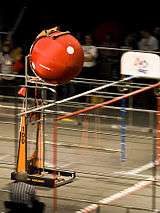FIRST Res-Q
| Season Information | |
|---|---|
| Year | 2015–2016 |
| Number of teams | 4500[1] |
| Championship location | St. Louis, Missouri |
| Awards | |
| Inspire Award winner | |
| Think Award winner | 3415: Lancers Livingston, New Jersey |
| Rockwell Collins Innovate Award winner | 7350: Watts NXT? Edison, New Jersey |
| Motivate Award winner | 4855: Batteries in Black Portland, Oregon |
| Connect Award Winner | 9205: The Iron Maidens Apple Valley , Minnesota |
| PTC Design Award Winner | 6299: Viperbots QuadX Austin, Texas |
| Control Award Winner | 6022: To Be Determined Aurora, Ohio |
| Promote Award Winner | 4924: Tuxedo Pandas Christiansburg, Virginia |
| Champions | |
FIRST Res-Q, released on September 8, 2015, is the 2015–2016 robotics competition for FIRST Tech Challenge. In the competition, two alliances, each consisting of two teams of high school students, compete to climb a mountain and score debris in alliance specific goals.[2] FIRST Res-Q is the eleventh FTC challenge.
Alliances
In each Match, the four teams competing are organized into red and blue alliances. The members of an alliance compete together to earn points. A Match consists of a thirty second Autonomous Period followed by a two minute Driver-Controlled Period for a total time of two minutes and thirty seconds. Alliances are selected randomly prior to the start of each competition.[2]
Field
The field for the competition is a square measuring 12 feet by 12 feet, which can be constructed by teams for practising prior to competitions.[1] Mountains consisting of alliance-specific climbing areas and goals are located in two corners of the playing field. Alliance-designated Zip Lines extend from the top of the Mountains to the playing field wall. Two alliance specific Rescue Beacons in need of “repair” by autonomous robots are located on the playing field perimeter wall.[3] At the beginning of each Match, debris, fifty 2-inch gold-colored plastic cubes and thirty 2.8-inch diameter white plastic spheres, is dumped onto the field.
Scoring
There are three sections to the game: the Autonomous Period, the Driver-Controlled (or Tele-Operated) Period, and the End Game. The criteria for scoring is different during each segment.
- Autonomous Period
In the Autonomous Period, robots run autonomously for thirty seconds. Robots gain points by: “resetting” Rescue Beacons, delivering Climbers to a Shelter, parking on the Mountain, and parking in the Rescue Beacon Repair Zone or Floor Goal.[3]
| Method | Points |
|---|---|
| Robot Parked in a Rescue Beacon Repair Zone | 5 points |
| Robot Parked in a Floor Goal | 5 points |
| Robot on the Mountain and Touching the Floor | 5 points |
| Robot Parked on the Mountain Low Zone | 10 points |
| Robot Parked on the Mountain Mid Zone | 20 points |
| Robot Parked on the Mountain High Zone | 40 points |
| Rescue Beacon Illuminated for an Alliance | 20 points per side |
| Climber in a Shelter | 10 points per Climber |
- Driver-Controlled Period
During the two-minute Driver-Controlled Period, teams can use standard gamepad controllers, each with two joysticks to operate their robots.[2]
| Method | Points |
|---|---|
| Debris Scored in a Floor Goal | 1 point each |
| Debris Scored in a Mountain Low Zone Goal | 5 points each |
| Debris Scored in a Mountain Mid Zone Goal | 10 points each |
| Debris Scored in a Mountain High Zone Goal | 15 points each |
| Robot on the Mountain and Touching the Floor | 5 points |
| Parked on the Mountain Low Zone | 10 points |
| Robot Parked on the Mountain Mid Zone | 20 points |
| Robot Parked on the Mountain High Zone | 40 points |
| Climber Released/Slid Down the Zip Line | 20 points each |
| Climber in a Shelter | 10 points per Climber |
- End Game
The final 30-seconds of the Driver-Controlled period is called the End Game. In addition to the Driver-Controlled period tasks, robots earn bonus points in the End Game by hanging from the Pull-up Bar on the topmost vertical section of the Mountain and claiming an All Clear Signal for their alliance..[2]
| Method | Points |
|---|---|
| Robot Completely Supported by the Pull-up Bar | 80 points |
| Claim an All Clear Signal | 20 points per Signal |
Advancement criteria
During tournaments and championships, Match wins are not the largest part of the advancement criteria. For example, the winner of the top judged award (the Inspire Award) ranks higher than the winner of the competition-based component (Winning Alliance Captain).[2] Winning lesser judged awards (Think Award, Connect Award, etc.) also plays a part in the advancement order.
After qualifying at a regional competition, teams advance to a "Super-Regional", consisting of teams from many different states. There are four regions in the United States, and each region has a "Host Location" where the actual competition will be held.[2]
